- Home
- Elizabeth Bear
The Tempering of Men
The Tempering of Men Read online
ACKNOWLEDGMENTS
The authors would like to acknowledge their debts to Snorri Sturluson (1179–1241), the author of the Prose Edda; the Viking Answer Lady and her fascinating and tremendously helpful website, www.vikinganswerlady.com; Dr. Robert J. Hasenfratz (for teaching Bear Anglo-Saxon all these years ago); Mitchell and Robinson’s A Guide to Old English; Jennifer Jackson, agent beyond compare; and Beth Meacham, for being the extraordinary editor that she is.
CONTENTS
Title Page
Acknowledgments
Chapter One
Chapter Two
Chapter Three
Chapter Four
Chapter Five
Chapter Six
Chapter Seven
Chapter Eight
Chapter Nine
Chapter Ten
Chapter Eleven
Chapter Twelve
Chapter Thirteen
Chapter Fourteen
Chapter Fifteen
Chapter Sixteen
Tor Books by Sarah Monette and Elizabeth Bear
Copyright
ONE
Vethulf and Skjaldwulf did not get along.
They had almost nothing in common. Where Vethulf was red, Skjaldwulf was dark. Where Vethulf was sharp-tongued, Skjaldwulf was taciturn. Where Vethulf’s temper ran hot and savage, Skjaldwulf would brood and consider before he spoke or acted.
There was only one thing they could agree on, and that was Isolfr. And agreeing about Isolfr did more to increase the tension between them than relieve it. For they both wanted him, desired him, cared for him, though he was as cold and distant and dutiful as any jarl’s daughter given in marriage unwilling. They needed him, not merely as men, but as the pair-yoked wolfjarls of Franangford. His recent two-month absence had made this unhappily manifest, even though he had returned from it with the unlooked-for svartalvish allies who had been the salvation of the entire Wolfmaegthing.
The Franangfordthreat could not manage without its wolfsprechend; it was too new, the ranks too unsettled, and the second bitch, Ingrun, and her brother Randulfr were not mete to fill a konigenwolf’s place in the pack.
That konigenwolf, Viradechtis—already a legend in the fifth year of her life, a konigenwolf of the sort who ruled songs and stories that were old when Skjaldwulf’s grandfather told them to the boy-child at his knee—had chosen two wolves to mate with, black Mar and odd-eyed Kjaran, and in that binding had bound their brothers Vethulf and Skjaldwulf to her brother, pale Isolfr. Thus they were bound also to Franangford, to lead its men as Viradechtis led its wolves.
Some mornings, still, Skjaldwulf woke disbelieving. He had never expected that Mar, his rangy wolf-brother, would be willing to fight and die to win Viradechtis. That half of his willingness had been Skjaldwulf’s own bone-deep longing for Isolfr seemed a greater gift than Skjaldwulf could ever be worthy of. It was not in either of them to wish to lead wolves, or wolfcarls, but if that was the price, they would accept it and call it fair.
Skjaldwulf was lucky and more than lucky that neither he nor Mar had died in the violent night that had founded the Franangfordthreat. For when Skjaldwulf had looked at Vethulf Kjaransbrother, he had seen in his eyes the same willingness to kill or die that he felt in his own heart. It was Viradechtis who had changed the story. She had come between Mar and Kjaran, and chosen them both.
Thus Isolfr was Skjaldwulf’s wolfsprechend, and Skjaldwulf thought that he was unlikely to lose that gift unless Mar through some unlikely circumstance offended Viradechtis. Whatever the tension between their brothers, Viradechtis, Mar, and Kjaran frankly doted on each other. Skjaldwulf (dark, ill-favored, spidery, and silent, as he had always thought himself) had that which he most wanted. He had Isolfr, who was like a white shadow drifting through the wolfheall—everywhere at once, listening, understanding, speaking quiet words that calmed men drawn taut by war or rut or personal enmities, or the enmities of wolves.
But he did not have Isolfr’s desire.
It could have been worse, Skjaldwulf admitted to himself, grimly snowshoeing over fluffy drifts, grateful enough that his turn at breaking trail afforded him a few hours’ isolation from the creaking, swearing mass of men, svartalfar, and wolves bound for Othinnsaesc and the battle that would, one way or another, be the resolution of a war between men and trolls that had cost them more than he cared to reckon. It could have been worse; Isolfr could have preferred Vethulf. Isolfr could have been actively cruel, rather than simply Isolfr: honorable, meticulous, ferocious in battle, reserved in peace. But Isolfr was also inward-looking—Skjaldwulf knew the signs, being afflicted with the disease himself—and as unwilling to be unkind as he was to accept Skjaldwulf as a lover. At least Skjaldwulf had the comfort, or the torment, of knowing that he would likely have Isolfr again, if only when Viradechtis went into season.
The memories were sharp, unhazed by the blur of wolf-rut, and that made them no easier to bear. Because while he wanted Isolfr, he wanted Isolfr, not Isolfr driven wild with Viradechtis’ heat, not Isolfr half-mad and half-lucid. He wanted an Isolfr who could demand as well as surrender.
And that problem would not admit of a solution.
Skjaldwulf snorted and shook his head, resting for a moment under his pack while the rest of the group caught up to him. His breath steamed; his calves were aching. It was time someone else took his place breaking trail.
So many of the wolves and men and svartalfar were wounded after the fighting to retake Franangford. So many, too wounded even to march, had been sent back to Bravoll, and Isolfr and Leitholfr’s care. So many, unfit for fighting, were at work as quartermasters, managing the rearguard, or sledging supplies along the extended line from Bravoll.
Skjaldwulf was unsurprised when Othwulf and Vikingr came up next to him. They were big and strong, wolf and man, and would have no trouble taking their turn. Othwulf patted Skjaldwulf on the shoulder and Skjaldwulf fell back, ready to return his snowshoes and switch to easier skis now that he was no longer engaged in tamping down the snow for the sledges. Mar would be glad of the opportunity to run free and hunt.
Skjaldwulf sighed heavily as he struggled with his bindings. He should just find a lover who wanted him. But that would only put the unfairness on another man, who did not deserve it, whereas this situation, Skjaldwulf thought with a bitter grin, he had brought deliberately and knowingly upon himself.
* * *
Skjaldwulf left his pack on one of the sledges, told Grimolfr where he was going, and checked Mar’s pads for ice crystals before they headed out. His plan was to strike out perpendicular to the hard-skiing column, to hang a little back from the front and keep an eye out for animals flushed by the advance. It was a strategy that had served them well in the past. They had good hope of bringing down a red deer or something similar in size, enough to feed many wolves and men.
Logistics: they had to march hard to have a chance of reaching Othinnsaesc before the trellwarren had bulwarked against them. But they also had to reach the overrun town hale enough to fight. Which, in the hard winter, meant they needed food and lots of it.
He heard crashing ahead—downwind, inconveniently—and skied softly toward it, Mar swinging wide to flank. Once Skjaldwulf was in position, he drove his ski poles into the snow and freed his fingers from his mittens. He nocked an arrow and drew his bow, sighting down the shaft—
—and paused when he head human voices, raised in argument over the crunching of snow. Voices he knew: Eyjolfr and Vethulf, and it did not sound like a friendly difference of opinion.
“I’ve my own tongue to speak my mind,” Eyjolfr said, and Skjaldwulf could not hear Vethulf’s answer, but he knew his wolfsprechend’s other wolfjarl well enough to know that whatever he said, it woul
d be scathing. Skjaldwulf sent his mind out to Mar, who was still swinging out on his arc. Mar had heard the wolfcarls, too, and knew this was not prey, after all. Skjaldwulf asked for silence and discretion.
Vethulf’s Kjaran and Glaedir—who was bound to Eyjolfr—knew they were there, but the wolves were keeping a good distance from their human brothers. The wolves were of different threats, Nithogsfjoll and the fledgling Franangford, this was not a fight that concerned them: it was not an argument over territory or bitches, but rather some obscure point of human dominance, and the wolves would not interfere unless it came to more-than-casual blows.
Skjaldwulf at first had a good mind to follow their lead. It was even odds that Vethulf had started the shouting match. Moreover, Skjaldwulf had had enough experience of Vethulf’s sharp-edged pride to have a pretty good idea of how he would react to Skjaldwulf’s interference.
But then he heard Eyjolfr’s answer to whatever Vethulf had said—“Have you ever considered that he avoids you because he doesn’t like you, wolfcarl? You’d not be the first to receive Isolfr’s grudging endurance, leavened by a little cruel flirtation”—and Skjaldwulf cursed under his breath, shoved the arrow back into his quiver, and grabbed for his ski poles even as he lifted the bow over his head with the other hand.
He had forgotten that Vethulf was not his only thwarted rival for Isolfr’s affections.
Skjaldwulf was skiing fast, the snow hissing under his feet, when he broke through the screening brush and came upon them. Both turned as he planted his poles to skid to a stop, and from the way Vethulf’s fists were clenched inside his deerhide mittens, Skjaldwulf had not arrived too soon. Glaedir appeared like a slanting beam of moonlight among the trees on the far side of the clearing. Skjaldwulf reached out to Mar with a thought.
Mar was beside him in a matter of moments, Kjaran running at his hip. And then there were three wolves, and three men, and Skjaldwulf released his ski poles and let his hands fall to his sides. “Eyjolfr,” he said, “your wolfjarl will want to speak to you.”
Which was truth, as far as it went, and through Mar and Grimolfr’s brother Skald, Skjaldwulf made sure that Grimolfr knew what to expect—a small example of the great conspiracy of wolfheofodmenn, so like the conspiracy of adults that Skjaldwulf had, when he was a child, already suspected. Meanwhile Eyjolfr still stared at him, arms folded, wide-legged on his snowshoes. “You are no man to order me, Skjaldwulf. I am not of your threat—”
“No,” Skjaldwulf said. “But Vethulf is of my threat. And Grimolfr is your wolfjarl. You will kindly heed my words.”
Eyjolfr looked down first. He huffed, glanced over his shoulder to collect Glaedir, and tromped off through the snow, showshoes hissing, arms swinging viciously.
When Eyjolfr was well away, Skjaldwulf regained his poles and skied to within conversational distance with Vethulf.
The next thing he knew, he was on his ass in the snow. Vethulf stood over him, face as red as his braids, shaking his right hand as if it hurt as much as Skjaldwulf’s jaw. “Hel take you,” Vethulf said venomously. “You have no idea what he was saying about Isolfr. He needs his foul mouth stopped.”
“Believe me,” Skjaldwulf said, “whatever poison he’s spreading, I’ve heard it.”
It would be awkward standing up in the skis. He was lucky he hadn’t twisted his ankle in the fall. He held up his hand for assistance, and Vethulf, after a grim pause, reached out and hauled him to his feet. At the edge of the clearing, Mar and Kjaran eyed them curiously, and then Mar turned and unceremoniously began to wash Kjaran’s ear.
“How can you stand to listen to it?” Vethulf asked, after an uncomfortable few moments in which Skjaldwulf dusted himself off and cast about for his ski poles.
Skjaldwulf shrugged. “I don’t listen. Eyjolfr is hotheaded and hurt in his pride. Anyone with sense knows that Isolfr hasn’t a cruel bone in his body. That, if anything, he gives too much to his wolf.”
“It’s what makes him a good wolfsprechend,” Vethulf said, stubbornly loyal. And then he looked down and cleared his throat, turning away.
Skjaldwulf closed his eyes. “Oh, Baldur’s tits. You, too?”
“Me, too, what?” Vethulf was defensive, arms crossed, the tails of his snowshoes denting the drifts as he rocked back on his heels, almost far enough to overbalance before he caught himself.
“You love him,” Skjaldwulf said, and—unwillingly—Vethulf nodded.
“He doesn’t care,” Vethulf said, with a shrug that lifted his bearskin coat around his ears. “He’d rather I were anyone else in the Wolfmaegth.”
“Vethulf, you idiot, he’d rather you were a woman.”
The look on Vethulf’s face, as if Skjaldwulf had cracked him over the head with one of his ski poles, was very nearly worth it.
“I’ve been threatbrother to him five years,” Skjaldwulf said carefully, “and I have never seen him choose a man when it was not for his sister’s sake. It is never easy for him to lie down for a man—never—and Viradechtis’ open mating…” Skjaldwulf couldn’t say it, for his own dignity, for Isolfr’s. His voice trailed off, and he shrugged.
“Aye,” Vethulf muttered. “I have heard a little.” And he tilted his head toward Kjaran and Mar. But Vethulf still wasn’t meeting Skjaldwulf’s eyes, staring stubbornly at the wolves, who lay in the snow, secure and warm in their fur coats.
It was uncomfortable, stringing so many words together when he wasn’t telling tales. But Skjaldwulf reminded himself that Vethulf was still a rather young man, sharp emotions not yet worn smooth by the passage of time. And Vethulf had not known Isolfr for five years, had not watched him grow from skinny jarl’s son into wolfsprechend of Franangford. “He isn’t playing us for jealousy. It’s not his nature. But what you want of him … is not his nature, either.”
Vethulf swallowed hard; Skjaldwulf saw his throat work under his scarf and his furs. “I would lie down for him, if he wanted,” he said, and then jerked his chin upward, sideways, as if a violent motion was the only way he could force himself to meet Skjaldwulf’s eyes.
“I know,” Skjaldwulf said. “So would I.”
* * *
By the time they returned to the army, camp was made, and they entered it in silence, Vethulf trudging along on his snowshoes as Skjaldwulf skied ahead. They had slung poles over their shoulders, and between them hung the gutted body of a winter-thin doe. Their beards and their wolves’ faces were red with the blood of the steaming, raw liver they had shared. Skjaldwulf sank down by a fire and unlaced his skis, exhausted, while Vethulf found someplace to pitch their tent. Mar and Kjaran insisted on sharing sleeping quarters—though Skjaldwulf would have expected them to form a ferocious rivalry, but perhaps wolves were more sensible than men in this as in so many things—and Skjaldwulf and Vethulf lived by the whim of their wolves.
When Vethulf was done, Skjaldwulf brought him hot wine. They sat side by side to eat their meager suppers.
Things were easier between them, somehow, though Skjaldwulf could read Vethulf’s lovesick misery in the set of his shoulders, and hated himself for forcing Vethulf to admit it—to himself as well as to Skjaldwulf. Meanwhile, Vethulf kept shooting him sidelong glances, as if he, too, were wrestling with some private guilt.
When Mar had finished crunching the raw, meaty marrowbone of the doe that he’d been allotted, he scrubbed his face and paws in the snow, leaving behind furrowed claw marks and pink-red bloodstains. He shook ostentatiously, sending snow flying, and nosed the flap of the hide tent. Kjaran, whose insufficient dinner had been slightly more than half of a hare, was right beside him, and Vethulf stood as well. “Good night, Skjaldwulf,” he said—the first words other than “thanks” and “hand me that” that had passed his lips since they’d killed the deer.
“I’ll be in as soon as I put the fire out,” Skjaldwulf answered. He smothered it quickly with handfuls of snow. All around, clustered on the lee side of tree trunks, other fires still burned in the darkness. Isolfr’s shieldbrothers�
��Ulfbjorn, Frithulf, and Kari—had the next camp over. Skjaldwulf wondered for a moment if they had promised Isolfr to keep an eye on his wolfjarls. It would be like Isolfr to worry.
And like him to keep it to himself, if he did.
Skjaldwulf pissed against the runners of the nearest unloaded and upturned sledge, so his urine would freeze into lubricating ice. He tucked himself away before anything more important could freeze, feeling the ache of the cold and the deer-hauling in his once-broken ribs and collarbone. Upon entering the tent, he peeled off his boots. The boots went into a sheltered corner of the tent beside Vethulf’s, with Skjaldwulf’s snowy trews laid over them. He spread his coat over the pile of bedding, snowy side up, but did not otherwise undress as he crawled over sleeping wolves and man to find his place.
The tent reeked of damp wolf and unwashed wolfcarl, but between the body heat and the insulating snow that Vethulf had heaped over its canvas walls, it was halfway warm. Under the covers, it would even be comfortable; Vethulf and two dog wolves threw off a good amount of heat. And Vethulf had made the sacrifice of crawling into the cold tent first, to warm it with his body. It was a sort of peace offering, like Skjaldwulf’s mulled wine.
And so was the way Vethulf—not yet asleep—lifted the blankets and furs, inviting him into the warm, reeking nest. Skjaldwulf went gratefully, drawing his knees up to his chest so his chilled, stockinged feet would be in the warmth.
It was a long way to Othinnsaesc still.
* * *
This time of year, the days shortened fast, to solstice and the inevitable endless nights that surrounded it. Hands of hands of days had passed by the time they came within striking range of Othinnsaesc. The assembled might of Wolfmaegth and svartalfar and wolfless men now rose and walked and slept again in darkness and brutal cold, stamping and swearing, breath smoking from straining lungs to rime hoods and beards with hoar.
On this morning, Vethulf, sliding from under the furs, cursed mightily. Skjaldwulf wanted to tell him to wait fifteen years. Skjaldwulf felt the teeth of winter sunk in every bone he’d ever broken, every joint he’d torn or strained. At his age, that sometimes seemed like most of them.

 Scardown
Scardown Worldwired
Worldwired Ancestral Night
Ancestral Night Hammered
Hammered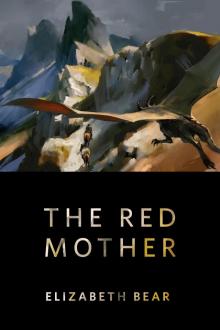 The Red Mother
The Red Mother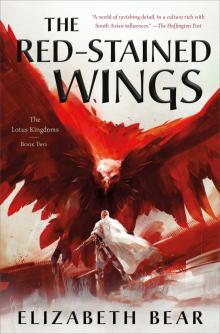 The Red-Stained Wings--The Lotus Kingdoms, Book Two
The Red-Stained Wings--The Lotus Kingdoms, Book Two Machine
Machine Some of the Best from Tor.com: 2019 Edition
Some of the Best from Tor.com: 2019 Edition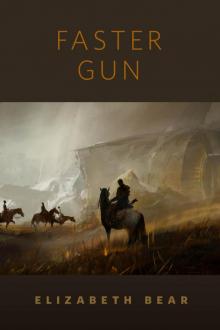 Faster Gun
Faster Gun In the House of Aryaman, a Lonely Signal Burns
In the House of Aryaman, a Lonely Signal Burns Stone Mad
Stone Mad Robots: The Recent A.I.
Robots: The Recent A.I. The Tempering of Men
The Tempering of Men Boojum
Boojum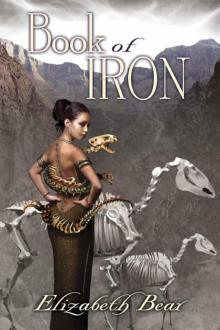 Book of Iron bajc-2
Book of Iron bajc-2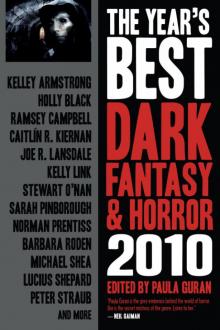 The Year's Best Dark Fantasy and Horror, 2010
The Year's Best Dark Fantasy and Horror, 2010 New Cthulhu 2: More Recent Weird
New Cthulhu 2: More Recent Weird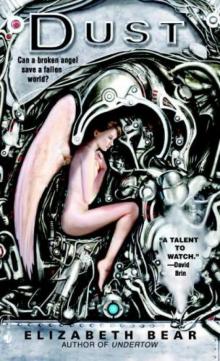 Dust jl-1
Dust jl-1 Worldwired jc-3
Worldwired jc-3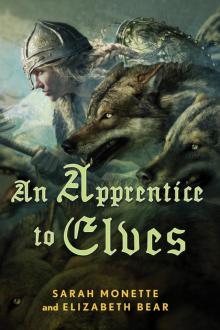 An Apprentice to Elves
An Apprentice to Elves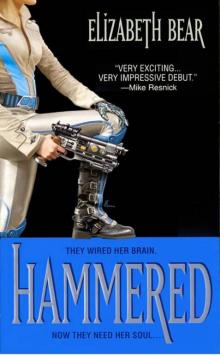 Hammered jc-1
Hammered jc-1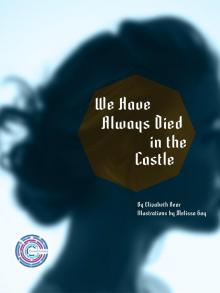 Crowd Futures: We Have Always Died in the Castle
Crowd Futures: We Have Always Died in the Castle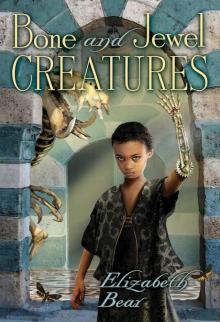 Bone and Jewel Creatures bajc-1
Bone and Jewel Creatures bajc-1 Carnival
Carnival Some of the Best from Tor.com: 2012 Edition: A Tor.Com Original
Some of the Best from Tor.com: 2012 Edition: A Tor.Com Original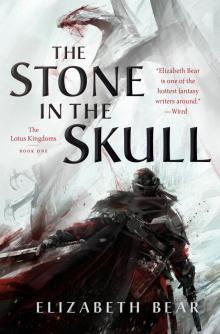 The Stone in the Skull
The Stone in the Skull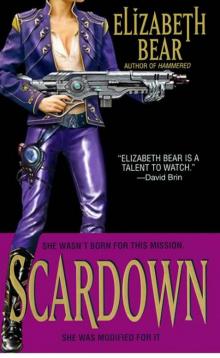 Scardown jc-2
Scardown jc-2 Hell and Earth pa-4
Hell and Earth pa-4 Undertow
Undertow Mermaids and Other Mysteries of the Deep
Mermaids and Other Mysteries of the Deep A Companion to Wolves
A Companion to Wolves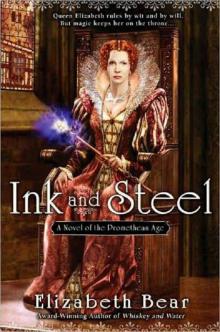 Ink and Steel pa-3
Ink and Steel pa-3